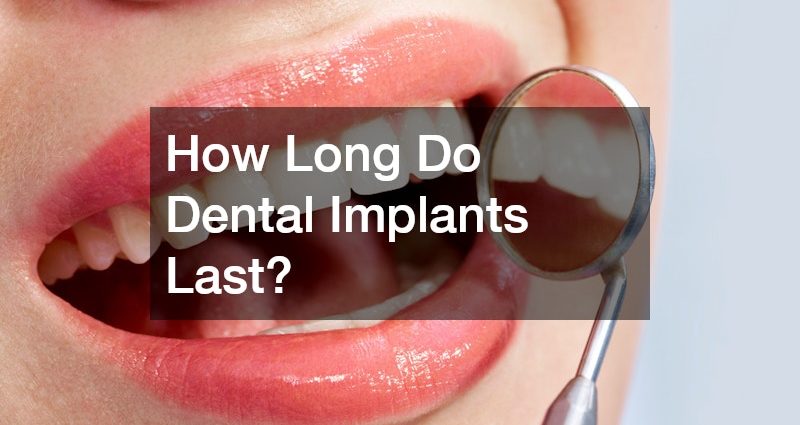
How Long Do Dental Implants Last?
Dental implants have become a trusted and popular solution for replacing missing teeth, offering both functional and aesthetic benefits. One of the most common questions patients ask is how long these implants can last. Understanding the factors that influence their longevity, comparing them to other tooth replacement options, and knowing how to care for them can help ensure that dental implants remain a durable and reliable choice for years to come.
This article explores these aspects in detail, providing a comprehensive look at the lifespan of dental implants and what patients can do to maximize their investment in oral health.
What Factors Influence the Longevity of Dental Implants?
Quality of Implant Materials
The materials used in dental implants play a significant role in their durability. Titanium and zirconia are the most commonly used materials due to their strength, biocompatibility, and ability to integrate with the jawbone effectively. Higher-quality materials typically result in a longer-lasting implant.
Patient Health and Lifestyle
General health and lifestyle choices can greatly affect implant longevity. Conditions such as diabetes or osteoporosis, as well as habits like smoking, can slow healing and increase the risk of implant failure. Patients who maintain good overall health tend to see better long-term outcomes.
Skill of the Dental Professional
The expertise of the dentist or oral surgeon performing the implant procedure is critical. Precise placement and careful planning reduce complications and enhance the long-term success of the implant.
Oral Hygiene Maintenance
Proper oral care, including brushing, flossing, and routine dental cleanings, is essential for preventing infections that could compromise the implant. Neglecting hygiene can lead to peri-implantitis, a condition that can shorten the life of an implant.
Type of Dental Implant Procedure
The specific implant technique and whether additional procedures, such as bone grafting, are required can also impact longevity. Tailoring the procedure to the patient’s unique oral structure supports long-term success.
How Do Dental Implants Compare to Other Tooth Replacement Options?
Longevity vs. Dentures
Dental implants typically last much longer than removable dentures. While dentures may need replacement every 5–10 years, implants can last decades with proper care.
Longevity vs. Dental Bridges
Unlike bridges, which rely on neighboring teeth for support and may need replacement after 10–15 years, implants are anchored in the jawbone, offering superior durability.
Cost-Effectiveness Over Time
Although dental implants may have higher upfront costs, their long lifespan often makes them more cost-effective than dentures or bridges over the long term, as fewer replacements and repairs are needed.
Functional and Aesthetic Differences
Implants closely mimic natural teeth in function and appearance, offering better chewing efficiency and a more natural look than other options.
Impact on Oral Health
Dental implants help preserve jawbone density and prevent bone loss, unlike dentures or bridges, which can accelerate bone resorption over time.
What Aftercare is Necessary to Prolong the Life of Dental Implants?
Regular Dental Check-ups
Routine visits allow your dentist to monitor the health of the implant and surrounding tissues, catching potential issues early.
Daily Oral Hygiene Practices
Brushing twice daily, flossing, and using antibacterial mouthwash are essential practices to prevent plaque buildup and infection.
Dietary Considerations
Avoiding hard or sticky foods that could stress the implant site helps maintain its integrity. A balanced diet also supports overall oral health.
Addressing Dental Health Issues Promptly
Any gum disease, cavities, or other oral health problems should be treated immediately to prevent complications that could affect the implant.
Avoiding Harmful Habits
Smoking, excessive alcohol, and teeth grinding can negatively impact implants. Using protective devices like night guards may help prevent damage.
What Are the Signs That a Dental Implant May Need Replacement?
Persistent Pain or Discomfort
Ongoing pain that doesn’t subside with normal healing may indicate a problem with the implant or surrounding tissue.
Implant Mobility or Loosening
A stable implant should feel secure. Any movement can signal bone loss or failure of osseointegration.
Gum Recession or Infection
Redness, swelling, or pus around the implant may suggest infection, which can compromise the implant’s success.
Visible Wear or Damage
Cracks or visible wear on the crown or abutment may necessitate repair or replacement.
Difficulty in Functionality
If chewing becomes painful or the implant no longer aligns properly with other teeth, evaluation by a dental professional is necessary.
How Has Technology Improved the Lifespan of Dental Implants?
Advances in Implant Materials
Modern materials such as improved titanium alloys and zirconia provide stronger, more durable implants with better integration with bone tissue.
Innovative Surgical Techniques
Minimally invasive techniques and computer-guided placement have increased precision and reduced complications, improving long-term outcomes.
Digital Imaging and Planning Tools
3D imaging and digital modeling allow for accurate implant planning, ensuring optimal positioning and minimizing risk of failure.
Research in Biocompatibility
Ongoing research in how materials interact with bone and gum tissue has led to implants that are less likely to be rejected or cause inflammation.
Emerging Trends and Future Directions
Developments such as surface coatings, bioactive materials, and personalized implant designs continue to extend implant longevity and improve patient outcomes.
Dental implants are a durable and effective solution for replacing missing teeth, often lasting decades when properly cared for. Their longevity is influenced by factors such as material quality, patient health, professional skill, and daily maintenance. Compared to dentures and bridges, implants offer superior functionality, aesthetics, and long-term cost-effectiveness. With advancements in technology and proper aftercare, patients can enjoy the benefits of dental implants for years to come. Consulting with a qualified dental professional is key to ensuring a personalized plan and achieving the best possible outcomes for your oral health.


